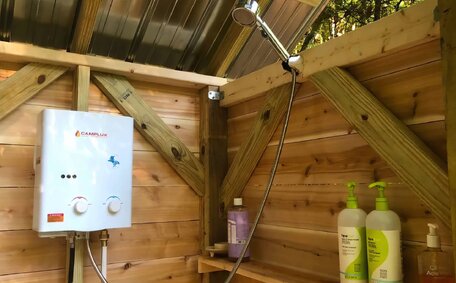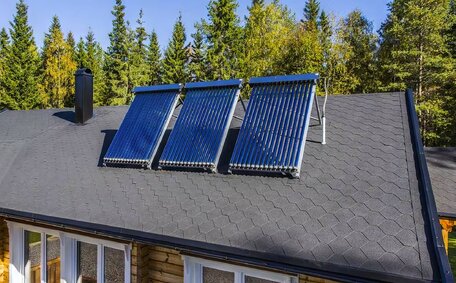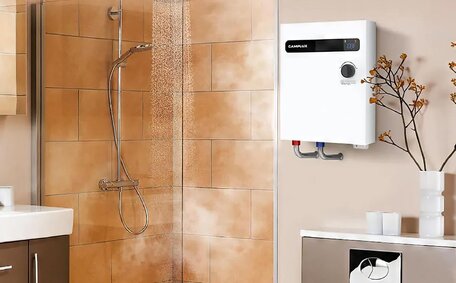Vital Tips to Prevent Water Heater Explosions
Explosions from hot water systems can have devastating consequences for homeowners. While rare, a build-up of pressure in the system can cause the tank to rupture violently. By being vigilant and taking preventative steps, you can dramatically reduce the risk of an explosion occurring.
Have Your Unit Serviced Annually
One of the most important things you can do is have your hot water system serviced by a licenced plumber every year. They will inspect the tank, heating elements, thermostat, inlet and outlet pipes as well as the temperature and pressure relief valve.
Any potential issues can be identified and rectified before they escalate. This regular maintenance helps extend the lifespan of your system.
Install Adequate Safety Valves
All hot water systems in Australia must be fitted with approved temperature and pressure relief valves. All hot water systems in Australia must be fitted with approved temperature and pressure relief valves. Make sure they are the correct rating for the size of your tank.
Have a plumber check they are functioning properly each year.
Keep The Unit Free of Sediment
Over time sediment can accumulate at the bottom of the tank. This limescale and corrosion debris can cause problems by coating the heating elements. Regular flushing every 2-3 years will remove sediment and maximise efficiency.
Update Older Models
If your system is more than 8-10 years old consider upgrading it for a newer model, even if it seems to be working fine currently. Newer tanks have more advanced safety features and controls. Replacing ageing components before they fail will prevent issues down the track.
Monitor For Leaks
Inspect the valves, pipes and connections regularly for any drips or leaks. Small leaks may seem harmless but can lead to bigger problems if left unchecked. Water on the ground near your hot water system could indicate an issue is developing.
Functional Pressure Valve
A properly functioning pressure relief valve is absolutely critical for avoiding water heater explosions. This safety component allows excess pressure to escape the system.
It serves as a crucial pressure release point.
A faulty T&P valve is unable to release pressure as designed. This allows dangerous pressure to continue climbing unchecked. The tank can eventually rupture violently if the threshold is exceeded.
Testing the T&P valve each year ensures it is working correctly. A plumber can manually activate the valve to verify proper operation and flow. If flow is obstructed, the valve may need to be replaced.
Installing a T&P valve sized correctly for your tank is also important. Undersized valves increase risk. Likewise, the discharge pipe must be the right diameter to avoid blockages.
By ensuring your water heater has a fully functional T&P valve, you remove one of the key factors in explosion hazards.
Temperature Maintenance
Keeping your water heater at the ideal temperature setting is a pivotal safety measure when it comes to avoiding explosions. Water heaters are designed to safely heat water to around 120-140°F. Exceeding the maximum temperature threshold raises the risk of excess pressure buildup.
Set your water heater’s thermostat to 120°F or lower, if possible, especially if you have young children or elderly residents. This provides adequate hot water for most general uses while minimising the chances of scalding injuries. Consult the manual for the optimal temperature range.
Check that your thermostat is accurately displaying the internal tank temperature. Faulty thermostats can misread temperatures, potentially allowing the unit to overheat undetected. A plumber should test calibration annually.
Combi and continuous flow water heaters don’t have thermostats. However, your licenced plumber will preset the unit based on your hot water needs and requirements. Do not attempt to alter these presets yourself.
In winter, you may be inclined to crank up the temperature. But avoid overriding factory temperature settings, even if your hot water seems lukewarm. The higher the temperature, the more pressure that builds.
Maintaining the correct water heater temperature all year round will keep your home safe. Monitor and control this crucial factor to minimise the chances of catastrophic tank failure.
Proper Heater Service
Having your hot water system regularly serviced by a qualified plumber is one of the most effective ways to prevent water heater explosions.
During a service, the plumber will thoroughly inspect all components of the system. They check that the temperature and pressure relief valve is in good working order.
They ensure the thermostat and heating elements are functioning properly. They also flush the tank to remove sediment buildup.
With annual servicing, minor issues can be detected early and repaired before causing bigger problems. Things like small leaks, faulty valves and corroded pipes are often picked up. Left unaddressed, these issues could lead to the dangerous pressure increases that cause tanks to rupture.
A licenced plumber also validates the system was installed correctly and is the right size for your home’s requirements. Improper installation often contributes to explosion risk.
They can also advise if your ageing system needs to be replaced. Older heaters are more prone to wear and tear. Upgrading them for a newer model with more safety features can prevent disasters.
Make water heater servicing a regular routine in your household maintenance schedule. The small yearly cost is minor compared to the consequences of an explosion. This simple preventative measure provides invaluable peace of mind.
Licensed Professionals
Having a licenced and qualified plumber install, repair and maintain your hot water system is crucial for preventing dangerous explosions. There are strict regulations governing the installation and servicing of water heaters in Australia.
Only licenced gas plumbers can legally install, alter or repair gas water heaters. Similarly, electric storage water heaters must be installed and serviced by a licenced electrician. Using unqualified technicians puts you at risk of improper or faulty workmanship.
It’s vital that Cranebrook Plumbing, as licenced professionals, perform annual servicing of your water heater. During servicing, our experienced plumbers thoroughly inspect all components and check for issues that could lead to explosive failure down the track. We ensure your system remains fully compliant and safe.
Upfront investment in professional installation and maintenance avoids the huge costs - financial and otherwise - of emergency repairs after an explosion. Don’t take risks with dodgy DIY fixes or backyard operators. Protect your household by using qualified tradespeople like our team at Cranebrook Plumbing.
Water Heater Explosions: Causes and Prevention
p>Water heater explosions, while uncommon, can have devastating effects. Understanding what causes them and how to prevent them is critical for homeowners. There are several key factors that can lead to catastrophic tank failures.
Excessive Pressure BuildupToo much pressure inside the tank is one of the main triggers for explosions. Pressure increases as the water is heated. Faulty components like bad thermostats, clogged valves and undersized pipes allow pressure to climb to dangerous levels.
Overheated WaterAllowing the water temperature to get too high is another cause. When water is heated excessively, the pressure rises rapidly. Defective temperature controls, sediment-coated elements and thermostat calibration errors can all result in overheating issues.
Deterioration and CorrosionAs heaters age, corrosion and mineral deposits inside the tank can weaken its structure over time. Eventually, the metal can split, rupture or blow out under pressure. Older tanks beyond their lifespan are prone to failure.
Incorrect SizingUsing a water heater that’s too small or large for your home’s needs affects the pressure levels. Improper sizing paired with inadequate safety valves is a dangerous combination.
Poor Maintenancep>p>p>p>p>
Signs that a Water Heater May Explode
There are several concerning signs that may indicate your water heater is at risk of exploding. Being aware of these warning signs allows you to take preventative action before disaster strikes.
Leaking T&P Valve
A leaking temperature and pressure (T&P) relief valve is one of the most common signs of impending explosion. The valve releases excess heat and pressure to prevent dangerous build-ups. Leaks indicate it may be blocked or faulty.
Rumbling or Banging Noises
Strange new rumbling or banging noises coming from the water heater are a worrying sign. This can indicate extreme pressure levels shaking the tank. Have a plumber inspect unusual sounds immediately.
Faulty Temperature Gauge
If the temperature gauge on your water heater is not working or displaying unusually high temperatures, this is a red flag. Faulty gauges cannot accurately monitor tank conditions.
Warm Water Turns Cold
If your hot water suddenly turns icy cold, it could mean the tank has ruptured and leaked out the water. This drastic temperature drop is a sign of a serious problem.
Rust Coloured Water
Rusty or discoloured water coming from your hot taps may be due to corrosion and sediment build-up in the tank. This debris can coat heating elements and lead to overheating issues.
Lower Water Pressure
A noticeable drop in your hot water pressure could indicate a partially blocked T&P valve. This safety component may not be releasing pressure correctly.
Pooling Water
Puddles of water near the base of your water heater may signal a small leak. Unresolved, minor leaks can progress into major tank failures.
How to Prevent a Water Heater Explosion
Preventing an explosion from your water heater is crucial for household safety. While rare, a catastrophic rupture of the tank can lead to major damage, injury or even death. By being proactive, you can almost eliminate the possibility of an explosion occurring.
Annual Servicing and Inspection
The most important preventative step is to have your water heater inspected annually by a qualified plumber. They will thoroughly check the T&P valve, thermostat calibration, heating elements, pipes and other components. Any issues can be repaired before becoming dangerous.
Proper Installation
When installing a new system, ensure a licenced plumber sizes, selects and fits the heater correctly for your home. Incorrect sizing and inadequate valves dramatically increase risk.
Monitor Temperature Settings
Never override the factory preset temperature settings on your water heater thermostat. Excessive heat builds pressure rapidly. Keep temperatures at 120°F or below if possible.
Upgrade Old Models
Replace water heaters older than 8-10 years with a newer system, even if no problems are apparent. Advanced controls and safety mechanisms in modern heaters prevent issues.
Monthly Visual Inspections
Inspect the physical condition of your water heater each month. Look for any new drips, leaks or unusual noises that may indicate issues needing repair.
Prevent Corrosion and Sediment
Have your plumber flush the tank every 2-3 years to control sediment accumulation. Use anode rods and corrosion inhibitors to reduce rust inside the tank.
With proactive maintenance, upgrades and safety awareness, you can protect your household from hot water heater explosions.






